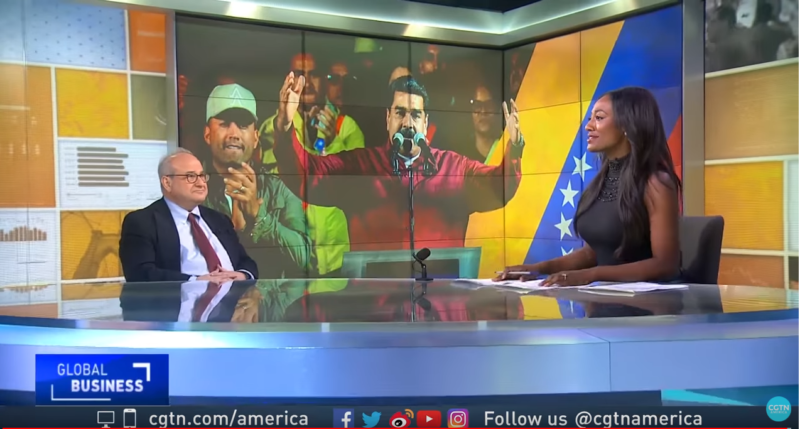Obama & Latin America: New Beginnings, Old Frictions
Today, signs of frustration are unmistakable in Washington and in many Latin American capitals, despite Obama’s immense personal appeal and the continued promise of a more productive partnership.
CGTN's Rachelle Akuffo spoke to Michael Shifter, president of the Inter-American Dialogue about the effect Maduro's re-election could have on Venezuela's already flailing economy.
“There is no sign in Venezuela that things are going to change. In the past, Maduro has talked about some reforms, but then nothing happens. His advisors stick to the same set of policies, and those policies have not produced results - but that hasn’t forced him to change.”
“Even though Venezuela’s oil economy is collapsing, it still produces 1.5 million barrels a day, and so it can still limp along for a while. It can’t limp along like that forever, it has been hit very hard and at some point, something has got to give whether politically or economically. That is its Achilles heel, the economy – 13,000% inflation, scarcity, and 5,000 Venezuelans leaving the country every day. Things will only get worse, but that doesn’t mean there is going to be a change in government.”
“Voter abstention hurts Maduro. I think he was hoping for a better turn out – he wants legitimacy, which is why he called this election. So it does hurt him in terms of that purpose, but it doesn’t hurt him in pushing him out of power – he controls everything, and the opposition doesn’t have a lot of leverage at all. The opposition is divided itself, it is weak.”
“This election per se I don’t think affects the oil global market, but Venezuela plays a role in keeping the quotas down and trying to put prices up. Part of their economic policy is a wish, a wish which is that oil prices go back up to the level that there were when Hugo Chavez was there and that would solve Venezuela’s problems, instead of taking though measures. And so it is doing whatever it can, and it does play a role in trying to boost prices in the oil market.”
“Maduro talked about cutting three zeros in the currency, but nothing really serious. There are options that were offered by his opponent, Henri Falcón, who didn’t do very well, but he has talked about dollarizing the economy, an idea that worked in Ecuador and in other Latin American countries that were suffering high levels of inflation. There are measures that are out there, but things like that would go against the orthodoxy of Hugo Chavez. I think Maduro wants to be faithful to the revolution, even though the results have been so tragic and so terrible.”
“Foreign investors have left or are leaving, and their departures are accelerating. There aren’t any foreign investors coming into the country. There are some oil companies and other companies that are still making money, so they are going to stay there, but it is certainly not an attractive place for investment. There is great uncertainty about what is going to happen, the economy is in terrible shape, the government is tightening its grip, and investors don’t like uncertainty, so I don’t think we are going to see a lot of new investment in Venezuela.”
“I think Venezuela’s economy is going to hit bottom at some point. Whether it is a major default, or something else happens, there is going to be a major crisis that is going to force some real changes, probably painful changes, and its recovery is going to take a very long time. It is going to require the support from the international community, the International Monetary Fund, and other financial institutions.”
Today, signs of frustration are unmistakable in Washington and in many Latin American capitals, despite Obama’s immense personal appeal and the continued promise of a more productive partnership.
Despite continued tensions among the Andean countries, four U.S. ambassadors painted an encouraging picture of regional stability.
Even with loaded dice, Chávez may be running scared. What to do to preserve power? That’s all that has ever mattered.
 CGTN / Youtube
CGTN / Youtube